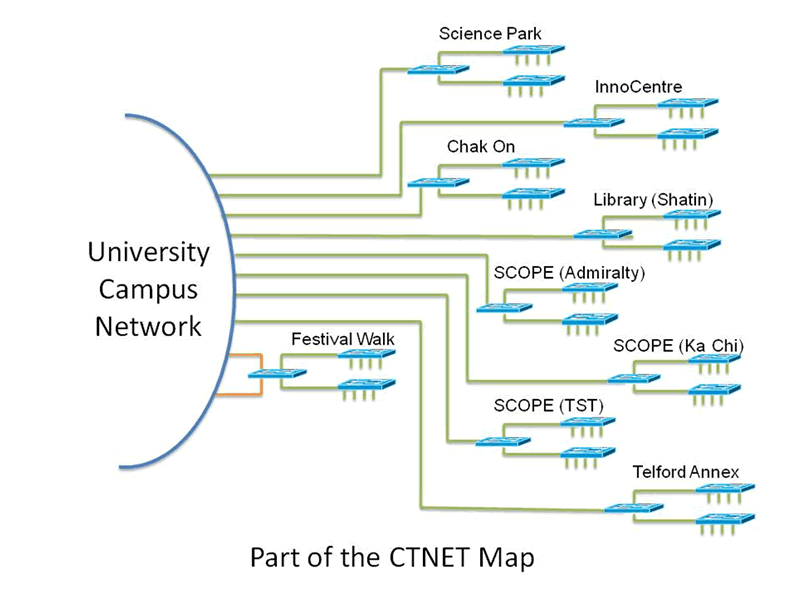Network Support for Remote Offices
Due to a shortage of space, the university is exploring various ways to accommodate new staff and academic programmes. One way of tackling this problem is to adopt a “core-satellite” approach. The “core” represents premises in the Kowloon Tong main campus while “satellite” refers to remote offices and learning centres outside of the main campus. As the number of remote offices and learning centres rises, CityU staff and students are now spread across a wide geographical area in Hong Kong (see map below).

As shown in the table below, these remote offices of varying sizes (indicated by the no. of computer outlets) have been around since 2008 and the total bandwidth allocated was normally determined by the number of users or computer outlets installed. But in some cases, departments may recommend the bandwidth themselves due to special needs.
More often than not, the Computing Services Centre (CSC) needs to rely on the Internet Service Provider (ISP) to provide the WAN links from the remote offices to the CityU’s main campus and the rental cost in general is proportional to the bandwidth subscribed. However, in the case of Festival Walk, the CSC had laid its own optical fibre cable between the CSC’s Computer Room and Festival Walk offices, consequently, the CSC was able to offer a higher bandwidth for Festival Walk than other remote offices without paying ISP any rental cost.
|
Remote campus location |
Usage |
Bandwidth |
Computer Outlet |
Installation Date |
|
Chak On Market, Sham Shui Po |
Staff office |
20 Mbps |
50 |
1-Jun-08 |
|
Festival Wallk, Kowloon Tong |
Staff office |
20 Gbps |
500 |
2001 |
|
GrandTech, Shatin |
Staff office |
100 Mbps |
20 |
25-Jul-08 |
|
InnoCentre, Kowloon Tong |
Staff office |
100 Mbps |
400 |
1-May-08 |
|
Science Park, Tai Po |
Staff office |
1 Gbps |
300 |
1-Feb-10 |
|
Ka Chi School, Shek Kip Mei |
Staff office & learning centres |
20 Mbps |
60 |
15-Dec-08 |
|
ChinaChem Golden Plaza, TST |
Staff office & learning centres |
100 Mbps |
300 |
1-Sep-10 |
|
Telford Annex, Kowloon Bay |
Staff office & learning centres |
100 Mbps |
- |
- |
|
United Centre, Admiralty |
Staff office & learning centres |
20 Mbps |
30 |
1-Oct-09 |
Every network, no matter how small, requires care in architecture, security, failover, and performance planning. One poorly designed and unmanaged remote campus can bring everyone down. In fact, the entire network team of the CSC will be involved in the following three stages when setting up a new network for remote offices:
- IT planning: work with CDFO to identify IT needs and respective procurement for remote offices including planning, budgeting, design, tender, contract administration, site supervision and coordination
- Project Implementation: monitor the progress of the structured cabling system installation and networking equipment installation including configuration, implementation, testing and acceptance of the network system
- Ongoing support: supervise the cabling work as requested by departments and monitor the network status 24x7 to ensure the remote IT infrastructure is working properly at all times
Furthermore, as a service provider, the CSC will ensure that both staff and students can enjoy the following set of network services as those on the main campus which include:
- Internet Service
- File & Print Service
- Video Service
- IP Phone Service
- Wireless LAN Service
Moving Forward
As set out in the IT Strategic Plan 2010-2015, the CSC will plan to strengthen and extend its support by establishing a common set of standardized network services and their corresponding service levels so that staff and students at remote offices and remote campuses can enjoy comparable, if not the same, quality of services. In particular, with more and more mobile devices and video services on the campus network, in order to achieve agility in network provisionings cost-effectively, the CSC will need to employ new technology to extend network services seamlessly to remote locations and to reduce latency during data transfer as well as to monitor and manage IT infrastructure remotely. In addition, the CSC plans to outsource on-site support to service providers whenever it is cost-effective to do so and will ensure adequate trainings be provided to local support staff at remote offices so as to reduce the support effort required from main campus to a minimum.